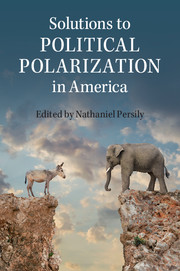Book contents
- Frontmatter
- Dedication
- Contents
- Contributors
- Introductory Chapters
- Reforming the Electoral System
- Strengthening Parties
- 8 Stronger Parties as a Solution to Polarization
- 9 Reducing Polarization by Making Parties Stronger
- 10 Focus on Political Fragmentation, Not Polarization: Re-Empower Party Leadership
- 11 Two Approaches to Lessening the Effects of Partisanship
- Empowering and Informing Moderate Voters
- Lowering Barriers to Policy Making
- Index
- References
11 - Two Approaches to Lessening the Effects of Partisanship
from Strengthening Parties
Published online by Cambridge University Press: 05 May 2015
- Frontmatter
- Dedication
- Contents
- Contributors
- Introductory Chapters
- Reforming the Electoral System
- Strengthening Parties
- 8 Stronger Parties as a Solution to Polarization
- 9 Reducing Polarization by Making Parties Stronger
- 10 Focus on Political Fragmentation, Not Polarization: Re-Empower Party Leadership
- 11 Two Approaches to Lessening the Effects of Partisanship
- Empowering and Informing Moderate Voters
- Lowering Barriers to Policy Making
- Index
- References
Summary
In recent years, scholars, journalists, and others have identified various possible causes for rising partisan polarization in U.S. government. They include underlying factors such as rising economic inequality, geographic sorting, new media, immigration, post–civil rights era party realignment and the Supreme Court's rulings on independent expenditures. In addition, there are contemporary political conditions, such as the white backlash against America's first African American president and the paralyzing consequences of divided government in Washington. Realistically, this means that any serious effort to dial down partisanship requires a comprehensive, multilevel strategy and a coherent, realistic vision of modern citizenship.
The dominant problem in U.S. politics in recent years can be characterized as democratic distortion – a skewing of process and policy in which the political system is too responsive to those with intense preferences, especially when they are ideologically extreme or oriented toward private gain at public expense. Ideally, the political process in a diverse, pluralist society should aggregate preferences fairly with a robust capacity for compromise. But the excessive influence of ideological extremists and the ability of concentrated economic interests to use the state for private gain suggest that we are drifting away from that goal.
The nub of the problem is that those with intense ideological preferences and/or concentrated material interests are better able and more willing to exert influence over elections and policy making in government. Preference intensity tends to increase with ideological extremity and the degree to which material interests are directly affected by government policies. Sometimes, ideology and material interests coincide (e.g., the Koch brothers) and sometimes they do not (e.g., Moveon.org). Party activists tend to have more polarized views than non-activists. Businesses, trade unions, and other regulated groups normally advocate for their narrow economic self-interests. Because those with intense preferences are also more willing to pay the opportunity and collective action costs associated with political participation (i.e., mobilizing the vote, contributing and spending money in campaigns, lobbying agencies, monitoring government actions, and the like), their influence is more constant and effective over time than that of less engaged citizens.
- Type
- Chapter
- Information
- Solutions to Political Polarization in America , pp. 157 - 164Publisher: Cambridge University PressPrint publication year: 2015
References
- 1
- Cited by



